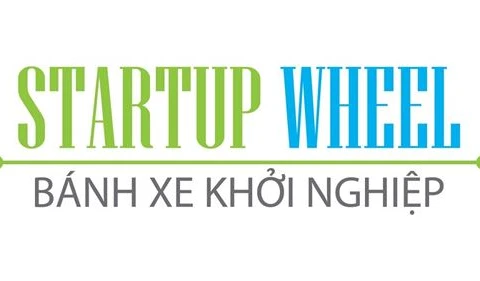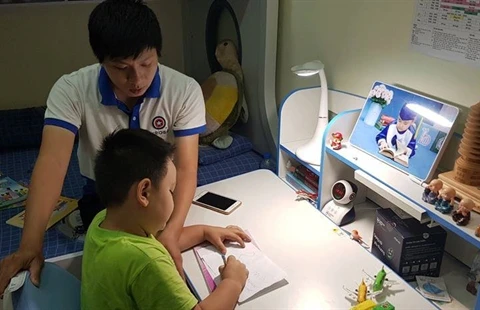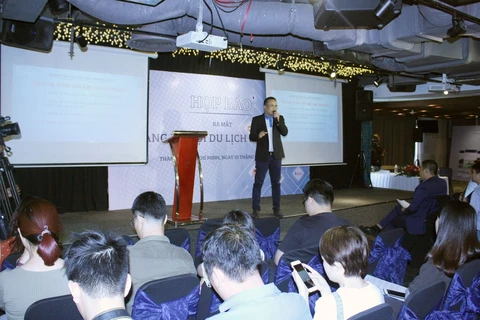 A FastGo motorbike driver. The firm became the first Vietnamese one in the ride-hailing sector to expand to foreign markets with its presence in Myanmar and Singapore now. (Photo: nld.com.vn)
A FastGo motorbike driver. The firm became the first Vietnamese one in the ride-hailing sector to expand to foreign markets with its presence in Myanmar and Singapore now. (Photo: nld.com.vn) Hanoi (VNS/VNA) - Nguyen Huu Tuat launched a Vietnamese ride-hailing firm a year ago, with dreams of scaling up the business overseas.
Many people told him he should develop fully in Vietnam before expanding abroad.
Half a year after its launch, FastGo became the first Vietnamese firm in the ride-hailing sector to expand to foreign markets, going some way to proving the doubters wrong.
Vietnamese start-ups have various approaches to going global, like attracting investment from foreign investors, going overseas themselves or partnering with international businesses.
Start-up founders with foreign ambitions face a tricky dilemma of whether to go local first then global, or try both at the same time.
“If I had targeted the Vietnamese market only, the market size then was small, not to mention my company was being ‘squashed’ by giant ride-hailing Grab and GoViet, another Vietnamese ride-hailing service be launched (at that time),” Tuat, FastGo CEO said.
Since he developed global digital-based technology for the service, it was not challenging for Tuat to bring it overseas half a year after it was launched in Vietnam.
In December 2018, FastGo opened in Myanmar, a market with rapid development in e-commerce, tourism, retail and the online economy.
It took FastGo only a month set up the service in Myanmar, thanks to its global-based technology.
This year it reached Singapore and recruited some 3,000 drivers in the first month.
Quan Le, co-founder and CEO of blockchain tech firm Binkabi has plenty of experience expanding overseas to places like the UK and African countries.
He said these some start-ups, especially software-based start-ups, can easily go global, as location matters less than a quality product.
FastGo is the second largest Vietnamese ride-hailing firm in number of users and rides and its CEO envisions expanding to other Southeast Asian countries.
The start-up hopes to double its user count of one million this year and plans to develop on-demand multi-services including daily rides (motorbikes and cars), travel, transportation, catering and personal finance.
Trial and error
Going global with FastGo was not the first time Tuat tried to bring his own Vietnamese start-up abroad.
Before FastGo, his first attempt with e-commerce start-up NEXT TECH failed. Three years after he tried to expand overseas, half of the stores closed due to tough competition with local companies.
“Going global early helped me learn lessons and grow up, especially in terms of strategies for selecting partners and human resources,” Tuat said. “Start-ups should co-operate with local companies to develop their products to increase the chances of success.”
From his experience, start-ups about to go global should ask themselves whether their business can compete with local companies and if the market size of the country they want to expand to is big enough to develop in.
Start-ups should also have a financial foundation and tech start-ups must have a technological foundation to scale up, he said.
“And for sure, the path is never rosy and full of failures. Maybe our first, second attempts will not be successful. Keep taking fearless steps to continue to try.”
Thorny path
Going global is not easy for most Vietnamese start-up owners, who are passionate and innovative, but lack experience.
Do Kim Dung, business development director of Ecomobi, a Vietnamese social selling platform that has offices in Singapore, Indonesia and Thailand, said obstacles for start-ups going global come from conflicts of mindset due to cultural differences between Vietnamese and people from other countries, especially in Muslim countries like Indonesia.
“When we expanded our business to Indonesia, the complicated local procedures were another obstacle for us,” she said.
Quan Le of Binkabi expanded his business in London and African countries.
“English speaking countries share the same legal basis as English law so we have commonality among markets. But in Africa, 54 different countries with different states of development and environment, there are many obstacles, not just about technology but also about legal aspects. When you try to bring something new to the market, it needs to adapt to the general population,” he said.
To help start-ups go global, the Government has collaborated with global ventures funds as part of a national programme for supporting an innovative start-up eco-system through 2025.
For example, the Korean Venture Investment Corp, in partnership with Vietnamese Ministry of Science and Technology, has entered the Vietnamese market and set up a joint venture fund to help Vietnamese start-ups explore the Korean market.
Besides ventures funds, Vietnamese start-ups can receive support from incubators, mentors and accelerating programmes.-VNS/VNA
VNA
























